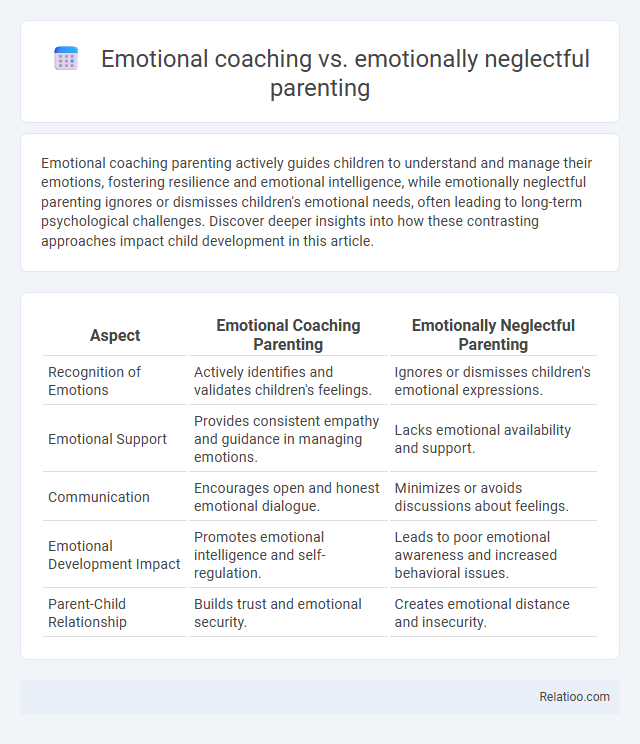Emotional coaching parenting actively guides children to understand and manage their emotions, fostering resilience and emotional intelligence, while emotionally neglectful parenting ignores or dismisses children's emotional needs, often leading to long-term psychological challenges. Discover deeper insights into how these contrasting approaches impact child development in this article.
Table of Comparison
| Aspect | Emotional Coaching Parenting | Emotionally Neglectful Parenting |
|---|---|---|
| Recognition of Emotions | Actively identifies and validates children's feelings. | Ignores or dismisses children's emotional expressions. |
| Emotional Support | Provides consistent empathy and guidance in managing emotions. | Lacks emotional availability and support. |
| Communication | Encourages open and honest emotional dialogue. | Minimizes or avoids discussions about feelings. |
| Emotional Development Impact | Promotes emotional intelligence and self-regulation. | Leads to poor emotional awareness and increased behavioral issues. |
| Parent-Child Relationship | Builds trust and emotional security. | Creates emotional distance and insecurity. |
Understanding Emotional Coaching
Emotional coaching involves recognizing, validating, and guiding a child's feelings to foster emotional intelligence and resilience, contrasting sharply with emotionally neglectful parenting, where a child's emotional needs are ignored or dismissed, leading to potential developmental and relational difficulties. This parenting approach emphasizes empathetic communication and helps children label and manage their emotions effectively, which supports better mental health outcomes and stronger parent-child bonds. Understanding emotional coaching is crucial for promoting secure attachments and aiding children in navigating complex emotional experiences with confidence.
Defining Emotionally Neglectful Parenting
Emotionally neglectful parenting is characterized by the consistent failure to recognize, respond to, or validate a child's emotional needs, often leading to feelings of invisibility and self-doubt. Unlike emotional coaching, which actively guides children through understanding and managing their feelings, emotionally neglectful parents ignore or minimize emotional expressions, impairing a child's ability to develop healthy emotional regulation. Your awareness of these distinctions is crucial for fostering supportive environments that prioritize emotional intelligence and well-being.
Key Differences Between the Two Approaches
Emotional coaching involves recognizing, validating, and guiding children through their feelings, fostering emotional intelligence and resilience, whereas emotionally neglectful parenting ignores or dismisses children's emotional needs, often leading to poor emotional regulation and low self-esteem. Key differences lie in the presence of empathy and active engagement; emotional coaching encourages open communication and problem-solving, while emotional neglect results in emotional disconnection and unmet developmental needs. Consistent emotional support in coaching promotes healthier mental health outcomes, contrasting sharply with the negative impacts associated with emotionally neglectful approaches.
Impact on Child Emotional Development
Emotional coaching in parenting fosters children's emotional intelligence by validating feelings and teaching effective coping strategies, promoting resilience and empathy. Emotionally neglectful parenting hinders emotional development, often resulting in difficulties with self-regulation, low self-esteem, and impaired social relationships. Consistent emotional coaching positively shapes brain development and strengthens parent-child bonding, critical for healthy emotional growth.
Communication Styles in Parenting
Emotional coaching in parenting involves recognizing and validating Your child's feelings while guiding them through emotional experiences using empathetic communication, fostering emotional intelligence and resilience. Emotionally neglectful parenting is marked by ignoring or dismissing emotional cues, leading to poor emotional regulation and low self-esteem in children due to a lack of supportive communication. In contrast, emotion coaching prioritizes open dialogue, active listening, and empathetic responses, which enhances trust and emotional security between parent and child.
Long-Term Effects on Mental Health
Emotional coaching fosters healthy emotional regulation and resilience, significantly reducing the risk of anxiety and depression in adulthood. In contrast, emotionally neglectful parenting often leads to impaired emotional awareness and increased vulnerability to mental health disorders over time. Consistent emotional support during childhood establishes a foundation for positive long-term psychological well-being and adaptive coping mechanisms.
Building Emotional Intelligence in Children
Emotional coaching fosters emotional intelligence in children by acknowledging their feelings, guiding them to understand emotions, and teaching appropriate ways to express and manage these emotions effectively. In contrast, emotionally neglectful parenting often overlooks or dismisses children's emotional needs, hindering the development of self-awareness and empathy essential for healthy emotional growth. When you practice emotional coaching consistently, your child builds resilience and social skills that contribute to long-term psychological well-being and interpersonal success.
Recognizing Signs of Emotional Neglect
Recognizing signs of emotional neglect involves identifying patterns such as lack of emotional responsiveness, minimal validation of feelings, and absence of empathetic communication from caregivers. Emotional coaching encourages parents to acknowledge and guide their child's emotions, fostering emotional intelligence and resilience. You can differentiate emotionally neglectful parenting by its failure to meet emotional needs, whereas emotional coaching actively supports emotional development through attentive and supportive interaction.
Strategies to Transition to Emotional Coaching
Transitioning to emotional coaching requires recognizing emotional neglect patterns and intentionally validating Your child's feelings through active listening and empathy-building techniques. Implement strategies such as naming emotions, modeling healthy expression, and setting consistent emotional boundaries to foster emotional intelligence and secure attachment. Prioritizing these approaches helps shift from emotional neglect to supportive guidance, enhancing Your child's emotional resilience and communication skills.
Supporting Parents Toward Positive Emotional Engagement
Emotional coaching empowers parents to recognize and validate their children's feelings, fostering secure attachments and emotional intelligence. Emotionally neglectful parenting often overlooks or dismisses children's emotional needs, leading to difficulties in emotional regulation and social development. Supporting parents through emotional coaching techniques enhances positive emotional engagement, improving parent-child communication and promoting resilience in children.

Infographic: Emotional coaching vs Emotionally neglectful parenting
 relatioo.com
relatioo.com